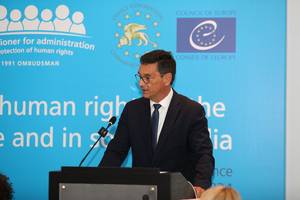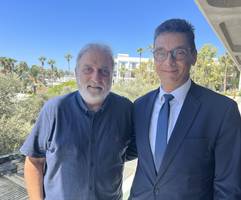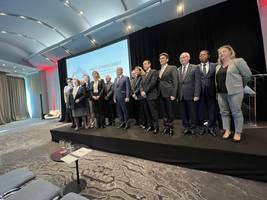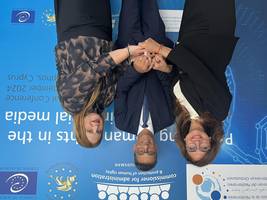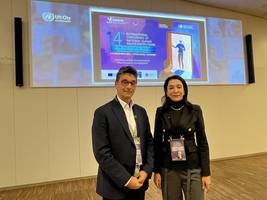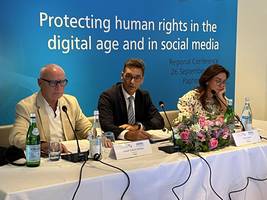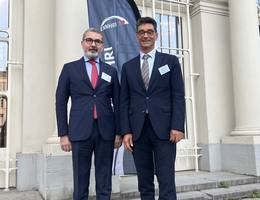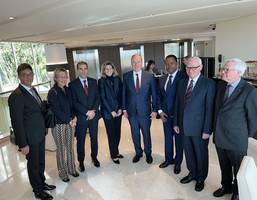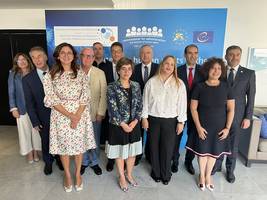On the invitation of the president of the Italian National Coordination of Regional and Autonomous Provinces, who is simultaneously the Ombudsman of the Italian province of Lazio, Marino Fradelli, the Slovenian Human Rights Ombudsman Peter Svetina is participating together with more than 100 of his colleagues from all over the world at an international conference in Rome about the role and competencies of Ombudsmen. In the Italian parliament, together with representatives of international organisations and guests from the academic and political worlds, they are discussing their work and the challenges they are facing in a time of global crises, which are strongly eroding the realisation of fundamental rights. The participants were addressed by, among others, the president of the Italian province of Lazio Antonello Aurigemma and the Mayor of Rome Roberto Gualtieri.
The participants found that consequences of wars, migrations, pandemics, climate change, and other crises we are facing around the world have thoroughly shaken our security and value system. They agreed that trust, democratic dialogue, connection, mutual respect, and humanity, which are the foundations of human rights, have been increasingly tested and they strived for the strengthening of the role of ombudsman organisations and national institutions for human rights. They also emphasised the importance of their financial independence, which derives from both the so-called Venice and the Paris Principles. Ombudsman Svetina stressed that the possibility of independent contextual operation is to a great extent dependent on financial autonomy. “In crises, we are witnesses to attempts to dissolve human rights. Human rights are interfered with citing various excuses about security, which must not be tolerated. Only strong institutions, independent from the bodies or institutions they monitor, can perform their tasks effectively.” As he said, human rights are like a mast – in turbulent times they are the centre, which we can hold on to so that we can maintain a clear course and it is easier to preserve our humanity. Our ancestors strived for centuries to secure the rights we take for granted. “Discarding them, abdicating them means to deny your humanity and all the efforts of generations before us, hence we need to fight for them constantly,” added Svetina.
In a debate with his colleagues from Greece, Morocco, Moldavia, Bosnia and Herzegovina, Ukraine, Italy, and Türkiye they determined that crises remind us of the significance of our rights which may at times seems self-evident. The Covid-19 pandemic, the war in Ukraine, migrations, and violent consequences of climate change, which we have recently experienced in Slovenia, Cyprus, Greece, and Bulgaria in the form of catastrophic floods, the vastest fires ever recorded in the European Union, earthquakes in Türkiye and Morocco, have severely affected thousands of people. The loss of property, jobs, various habitats, fertile farming land, and forests, which also endangers the security and supply of drinking water and food, have caused unimaginable distress. “In an era of egoism, individualism, indifference, and selfishness some answers to current challenges must be sought in cooperation and solidarity,” believes Ombudsman Svetina. We can be solidary only in a relationship that accepts the culture of the other and their dignity, which Slovenians proved with selfless determination to help our fellow man in distress during the destructive floods at the beginning of August,” Peter Svetina described the situation in Slovenia to his colleagues.
The participants also touched upon the issue of respecting the human rights of migrants or refugees and stressed the importance of interstate or regional solidarity. “It is the obligation of every country to provide appropriate conditions for the reception of seekers of international protection by providing them with the appropriate living standard and ensuring their existence as well as protecting their physical and mental health. Each in our own respective fields of operation we must prioritise those among us who are at a given time the most vulnerable,” said Svetina before going on to emphasise the importance of personal responsibility. In his opinion, the solidary future for all can only be built when it is no longer an individual at the centre but the entire community. His colleagues endorsed Svetina’s position that the issue of respecting human rights of migrants should be appropriately addressed on the supranational level, about which he recently wrote to the European Commission. “Concerted action of states in this area is crucial. The European Union forms a joint policy on asylum and international and temporary protection with the purpose of providing the appropriate status to citizens of third counties who need international protection, and respecting the non-refoulment principle,” reminded the Ombudsman and added that EU law imposes certain obligations on the member states in the field of asylum and migration policies, which cannot be simply overlooked or bypassed unilaterally.
The Ombudsmen agreed that the international community will have to do more in the field of respecting international humanitarian law and the law of human rights. The same goes for establishing a single mechanism for monitoring migrants in the EU member states and their non-discriminatory treatment and appropriate recording with the goal of protecting them from potential abuse. In the words of Peter Svetina, states should include in their migrant-related activities their structures for combating human trafficking, including the police, and they should also strengthen cooperation with relevant non-governmental organisations. He believes that to successfully prevent abuse, intensified cross-border cooperation and flow of information are necessary, including through Europol. In this regard, it would be wise to strengthen the role and mandates of ombudsman institutions – for example, for monitoring implementation on the borders.
On the sidelines of the conference, the ombudsman Svetina also met with the Ambassador of the Republic of Slovenia to Italy, Matjaž Longar, and the Ambassador of the Republic of Slovenia to the Holy See, Franc But.


